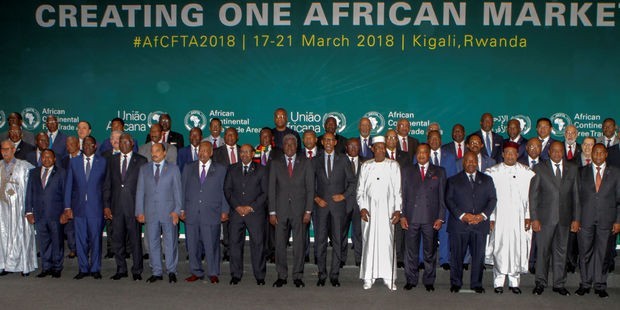More than ever for Africa, unity is strength. Forty-four countries of the continent signed the agreement creating a Continental Free Trade Area (Zlec) on Wednesday, March 21, 2018 in Kigali, which is seen as essential for Africa’s economic development, the African Union (AU) announced . “Economic integration thus responds not only to an aspiration born of Pan-Africanism, but also to a practical imperative linked to the economic viability of the continent. “
Having been seen by many as obvious since the signing of the Abuja Treaty in 1991 as a legal basis, it took some time for the Member States to finally make the move.
A step closer to integration and unity?
“The agreement establishing the Zlec has been signed by 44 countries,” confirmed AU committee chairman Moussa Faki Mahamat, concluding a summit of the organization in the Rwandan capital. This Free Trade Area (FTA) is a dream that is more than a century old. The signing of the Free Trade Agreement on June 10, 2015 at the Sharm el-Cheick Summit in Egypt, came after first tremors in 2012. It first involved Southern, Eastern and Southern Africa. Central Africa representing the merger of the three regional blocks (Comesa, CAE and SADC), composed of 26 countries. If its implementation was scheduled for June 2017, national ratifications of the treaty have been delayed, particularly in key countries like Nigeria, which has finally pulled out of the process, to everyone’s surprise. Nigerian President Muhammadu Buhari had decided not to move to Kigali, after agreeing to “give more time to consultations” in his country, while one of the largest unions in the country, the Nigeria Labor Congress (NLC) , said he feared the negative effects of the Zlec for the national economy. This union had also asked to be more involved in the negotiations.
The obstacles are still numerous
Other non-signatories, whose exact list has not been provided, include Benin, Eritrea, Burundi, Namibia and Sierra Leone. Some highly protectionist countries, such as Algeria, have signed them.
“Some countries have reservations and have not yet finalized their consultations at the national level. But we will have another summit in Mauritania in July and we hope that the countries with reservations will then sign, “said AU Commissioner for Trade and Industry Albert Muchanga.
In the longer term, this merging of economic zones could be the impetus for the even more ambitious AU project to pave the way for the acceleration of the establishment of the Customs Union in 2022, and African Economic Community by 2028. If the 55 AU member countries sign the document, the Zlec will open access to a market of 1.2 billion people, for a cumulative GDP of over $ 2.5 trillion . On the other hand, the AU believes that the gradual elimination of tariffs between Zlec members will increase the level of intra-African trade by 60% by 2022.
Project critics note that the poor quality of transport infrastructure and the lack of complementarity between African economies are hindering the development of intra-African trade.
Currently, only 16% of Africa’s trade is with other countries in the continent, while in the EU, Asia and North America, intra-regional trade accounts for 70% of total trade. %, 52% and 50% of the exchanges. In addition, Africa’s share of world trade is even more paltry, accounting for only about 2%. Far from being settled, remains the question of the mobility of workers between African countries, one of the most contentious issues for African leaders because of problems of security or political instability. To enter into force – not before 180 days – the agreement has yet to be ratified nationally by the signatory countries.
Le Point Afrique


Leave a Reply